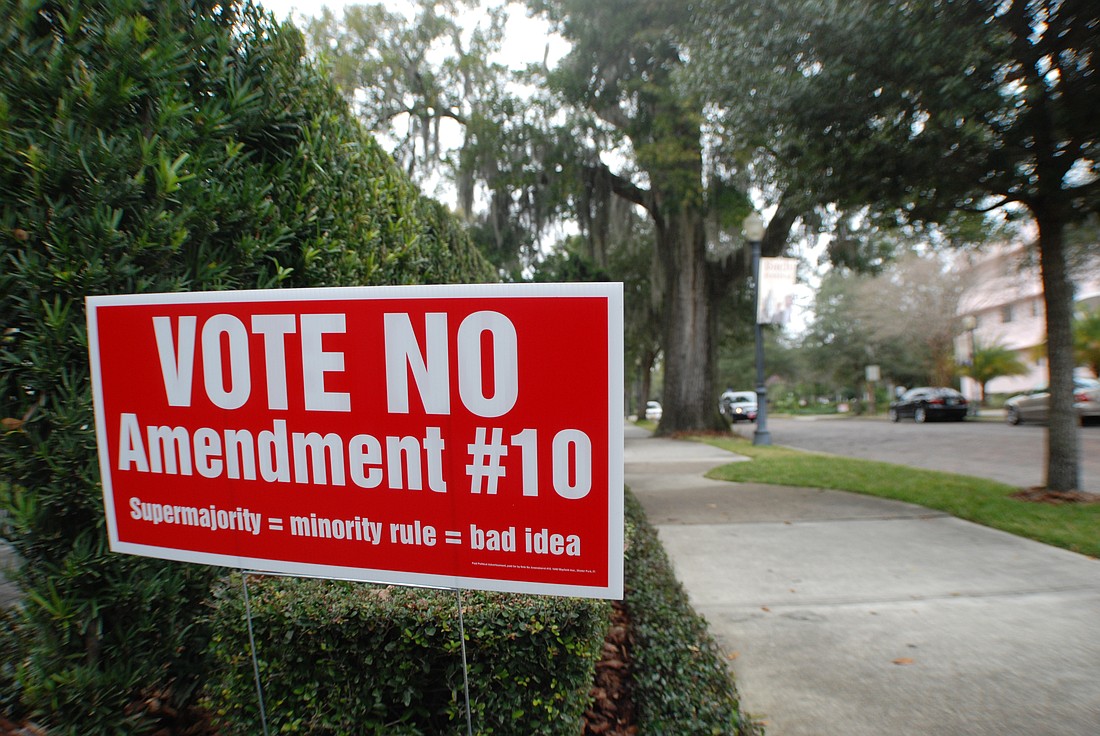- April 15, 2024
-
-
Loading

Loading

A city ordinance requiring a supermajority vote for land-use changes will not be removed from the books, after the Commission sat in silence when called to vote March 22 to repeal it.
That ordinance had been in place since a January vote by the Commission made a supermajority or 4-to-1 vote necessary to change land use in the comprehensive plan. On March 9, the voters shot down a charter amendment that would have mandated the supermajority vote.
Mayor Ken Bradley denounced some members of the Commission, though not by name, for what he called going against what the residents want.
Bradley argued that since the voters didn't want a supermajority vote in the more binding charter, the Commission should repeal the less-binding ordinance.
But Commissioner Beth Dillaha said that the Commission and the voters voted on two different issues, and that the Commission shouldn't have to reverse its decisions.
"This is an apples to oranges scenario," Dillaha said. "If [supermajority voting] were in the charter, then it means the only way it could come out of the charter is for the citizens to vote on it. You'd have assurances that a supermajority vote would always be required. But when you have an ordinance, any future commission could repeal it."
At the March 22 Commission meeting, Bradley had attempted to do just that — repeal the ordinance. At the end of the meeting, he asked the Commission to consider doing so.
The Commission met the motion with silence, save for a comment from Commissioner Phil Anderson.
"I'm perfectly happy with the citizens' decision not to put it in the charter," Commissioner Phil Anderson said.
Anderson did not speak in favor of removing the ordinance.
"I'm asking that since that did not pass [in the March vote] that we align that with the will of the people," Bradley said.
He would only need three votes from the Commission to do so, though he received none.
"There was silence because no one agreed," Dillaha said in an interview.
After the vote, Bradley expressed frustration with fellow commissioners.
"We have a commissioner who's traveling around the state saying 'Let's follow the will of the people,' yet we didn't listen to them on SunRail and we haven't listened to them on the charter," Bradley said. "I'm very intrigued why we wouldn't be listening to the voters."
He pointed to the vote against the charter amendment that would have required the supermajority, noting the relatively wide gap of voter disapproval of the amendment a margin of 53 percent to 47 percent.
"It was a little bit higher than some of the commissioners were elected by," Bradley said.
"We need to seriously look at how we look at the charter amendments from now on."
Two of the commissioners — Carolyn Cooper and Tom McMacken — who refused to repeal the ordinance at the March 22 meeting had been sworn in for their first terms in office that day, and were not present at the January vote that had established the supermajority ordinance.
The election of the two new commissioners was seen by some as a referendum against development, as Cooper and McMacken had championed more controlled growth. The passing of the supermajority change to the charter was seen as a key legislative tool to make it more difficult to change land use for new development, though it did not pass.
Dillaha said a well-funded campaign doomed the charter amendment.
"There was a big negative campaign against it, which created enough confusion with the citizens," she said. "Anytime you have that situation, they're going to vote no. "
Bradley said the Commission should be further in line with the intent of the voters, which he said showed the public was against a supermajority vote.
"The question for me is, when are we going to listen to the will of the people?" he said. "You can't have it both ways. You either listen to the will of the people or you don't."